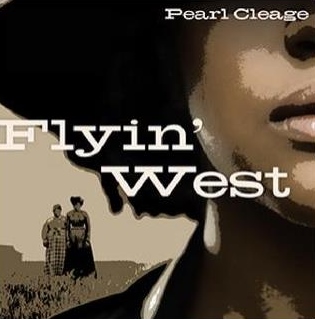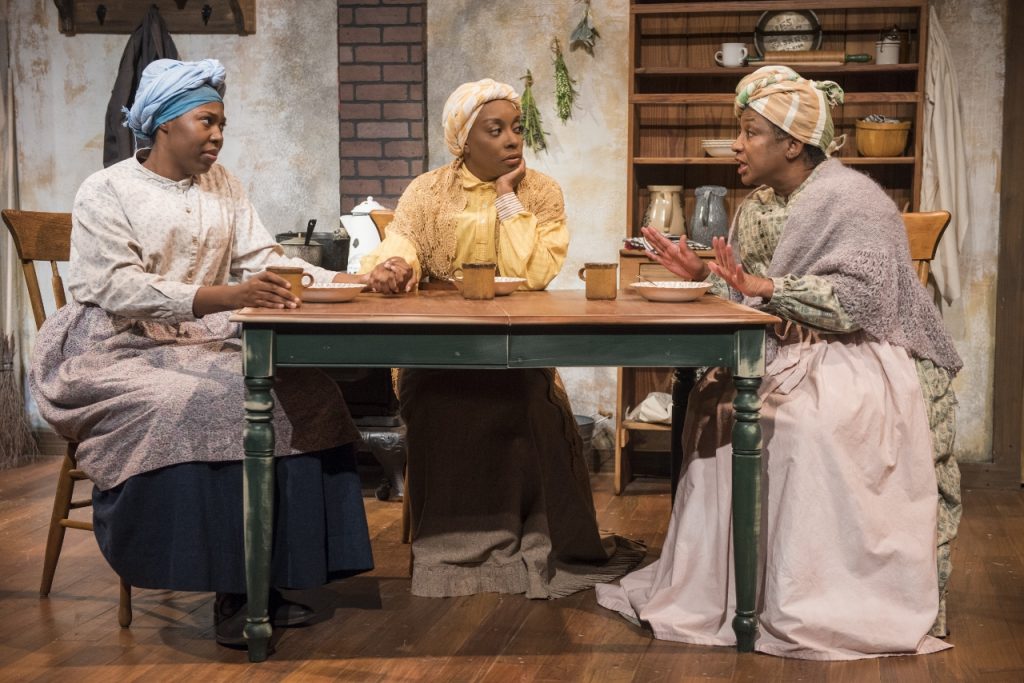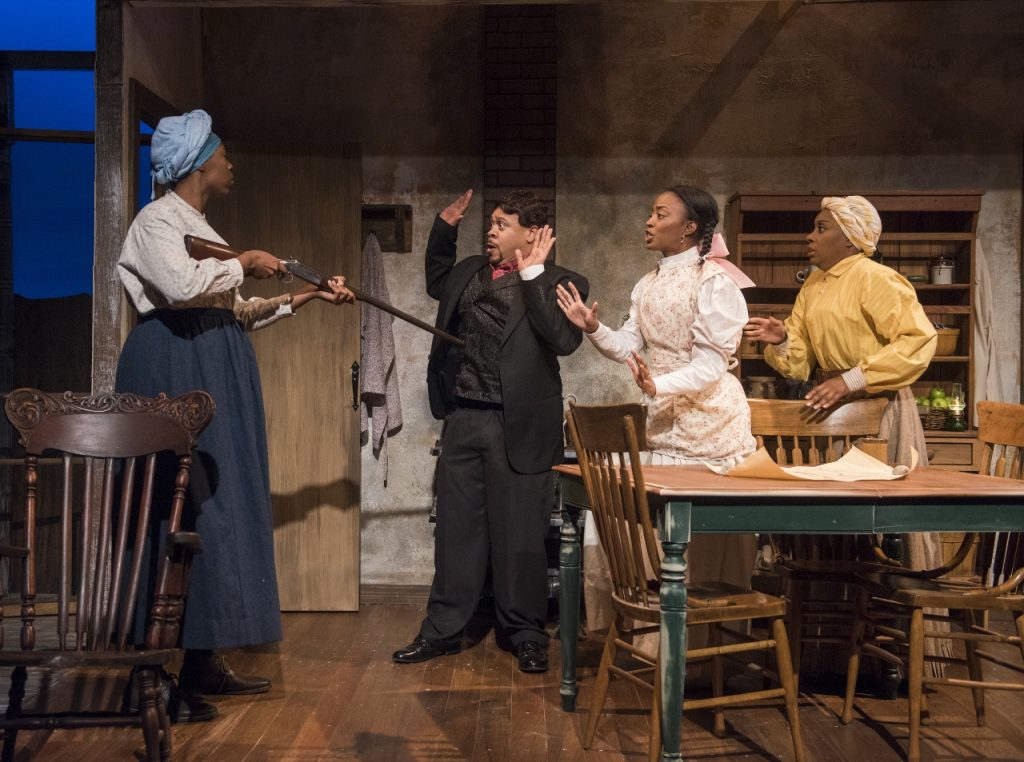FLYIN’ HIGH: THE HEARTLAND SOLIDARITY
OF SODBUSTING SISTERS
For a while it must have seemed like a black Eden. Founded in 1877, Nicodemus, Kansas was a Reconstruction success story founded on a racial covenant. It offered a second chance for former slaves and future dreamers: The reputedly all-black town was the enlightened creation of the 1862 Homestead Act. A mere $12 could get emigrants from the East, not just 40 acres and a mule, but a new life to boot. 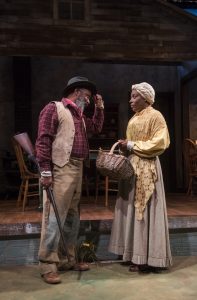 Pushing plows, feeding cattle, reaping crops, and raising children not cursed by the bondage of sharecropping, black women fled both white bigotry and male tyranny — and found common cause and cooperation with the local Osage tribe.
Pushing plows, feeding cattle, reaping crops, and raising children not cursed by the bondage of sharecropping, black women fled both white bigotry and male tyranny — and found common cause and cooperation with the local Osage tribe.
Pearl Cleage’s 1992 drama Flyin’ West celebrates their resilience, spunk, and loyalty. Superbly shaped by the redoubtable Chuck Smith, this revival by American Blues Theater powerfully depicts the promise and peril of this new dispensation, its name commemorating a Biblical foe to slavery.
Cleage’s two acts also wonder: How far must you flee to find the right frontier, a refuge to grant and preserve freedom? And what if the baggage carried by trains and wagons includes unresolved inequities between men and women that threaten to destroy the dream? Internal rifts and external greed will endanger this hard-hoping Utopia. Happily, by play’s end Flyin’ West honors the settlers’ great expectations, enough to give them currency again.
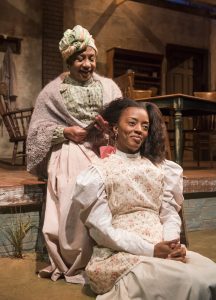 It’s the fall of 1898. Jim Crow laws seek to set up a second slavery. Three African-American women from Tennessee are literally digging a destiny in the state where John Brown in effect began the Civil War.
It’s the fall of 1898. Jim Crow laws seek to set up a second slavery. Three African-American women from Tennessee are literally digging a destiny in the state where John Brown in effect began the Civil War.
Rifle-toting Sophie Washington (Tiffany Oglesby) is a laughing laundress who met her pioneer pals in Memphis and shares their passion for a clean life on the prairie. The other survivors are a feisty, no-nonsense and larger-than-life matriarch named Miss Leah (Joslyn Jones), a churchgoing ex-slave with a corncob pipe and feisty wisdom to spare. Completing this female family is serious Fannie Dove (Sydney Charles), a proper lady who’s busy chronicling their struggles (possibly for a play 92 years later). The women remember and reenact a “ritual” where they vow friendship and fidelity to their future.
Clumsily courting Fannie is grizzled Wil Parish (Henri Watkins), an illiterate handyman from Florida with a sweet soul who fondly recalls his seven years in Mexico.
Finally, calling the happy exile into question, two very different visitors arrive from New Orleans for a protracted stay. Fannie’s baby sister Minnie Dove Charles (Tiffany Renee Johnson) is accompanied — and menaced — by her mulatto husband Frank 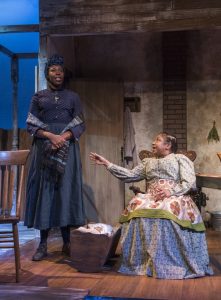 Charles (Wardell Julius Clark), an amateur poet and disciple of Paul Laurence Dunbar.
Charles (Wardell Julius Clark), an amateur poet and disciple of Paul Laurence Dunbar.
Fancy Frank, a snobbish interloper and spouse abuser, looks down on his too-dark brethren, especially his adoring and enabling wife who’s newly pregnant. For Frank the prospect of having a child that’s more Negro than white triggers a ton of narcissistic insecurity.
Creepy with insufferable arrogance from living in less-prejudiced places like London and Paris, Frank purports to “rise above” racism, only to be disappointed when his venal step-brothers deprive him of his share of his white father’s bequest. Plotting payback on his own people, Frank schemes for ways to exploit his wife’s portion of the sisters’ deed to the property. Outside speculators (namely white investors), it seems, have designs on the cropland and resources.
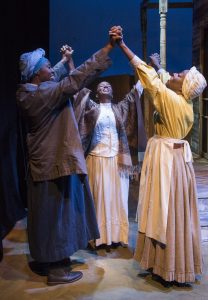 Suddenly these homesteaders confront a much closer hazard than locusts or drought. Undeterred by an in-law’s practiced perfidy, the sodbusting “sisters” concoct a remedy that’s as American as apple pie.
Suddenly these homesteaders confront a much closer hazard than locusts or drought. Undeterred by an in-law’s practiced perfidy, the sodbusting “sisters” concoct a remedy that’s as American as apple pie.
With compassion and good humor, Cleage details the endearing particulars of four remarkable women and two rightly marginal men. There may be wishful thinking in the play’s pretense that Nicodemus was ever all black or particularly prosperous, but there’s no doubting the bedrock decency — or accuracy — of these characters. Each is a rich gift from a generous playwright to six consummate actors.
No question, Smith cherishes Cleage’s creations. Despite the second act’s more melodramatic moments, he keeps them real, fresh and forceful across six generations and 120 years.
Each July, former residents and their descendants return to Nicodemus for parades and celebration. In the same spirit, Flyin’ West transforms their legacy of enduring love into golden theater.
photos by Michael Brosilow
Flyin’ West
American Blues Theater
Stage 773, 1225 W. Belmont Ave.
ends on November 3, 2018
for tickets, call 773.654.3103 or visit American Blues Theater
for more shows, visit Theatre in Chicago
